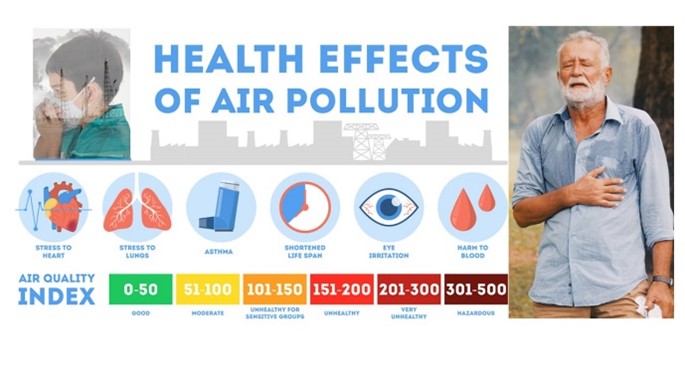
Project Point of Contact: Asif Rizwan, PhD (Primary) and Olga Brazhnik, PhD (Primary, DSCC co-chair) Colin Wu, PhD (Primary); Erin Iturriaga, DNP, MSN; Sweta Ladwa, MPH; Larry Fine, MD DrPH; Regina Bures, PhD
Goals and Objectives: The National Heart, Lung, and Blood Institute (NHLBI) seeks a DATA Scholar to leverage NHLBI’s data science resources in generating new knowledge on the impact of environmental exposures (exposome), including climate factors, on heart, lung, blood, and sleep (HLBS) conditions. The DATA scholar will lead efforts to integrate the linkage of geospatial, temporal environment, and climate data with complex multi-modal health and population data available in NHLBI data repositories such as BioData Catalyst (BDC), NHLBI’s cloud-based data science ecosystem (https://biodatacatalyst.nhlbi.nih.gov/).
DATA Scholar roles and goals include:
- Assess the data sources and geo-spatial factors that are important for the NHLBI mission, create an inventory of NHLBI’s datasets with available longitudinal geocoded data (e.g., residential, occupational, etc.), and develop strategies for integrating environmental (both natural and manmade) data into the BDC ecosystem with NHLBI datasets.
- Participate in collaborative trans-NIH efforts, including the NIEHS-led PCORTF Climate and Health project, to identify and prioritize high value datasets with exposome data..
- Synthesize a needs assessment to inform development of data science activities to address challenges. Activities might include developing training materials, planning and implementing workshops, and hackathons.
- Collaborate with staff and scientists from NIH and NHLBI extramural and intramural divisions to develop analytical procedures and tools, including machine learning, computing algorithms and statistical risk/disease prediction models, to study linked temporal-spatial relationships between NHLBI disease biomarker and health outcome data (coronary heart disease, stroke, pulmonary hypertension, and non-neoplastic blood disorders, etc.) and climate and environmental data. Prepare publications based on the research findings.
Significance: This project proposal spans the missions of the NIH and NHLBI to help address critical evidence and data gaps associated with the health impacts of climate-related events by moving toward integrating environmental and exposure information with health data generated by NHLBI researchers. The DATA Scholar will utilize NHLBI computing power and data resources as well as data from other NIH ICs (e.g., NCI and NIEHS) to address critical questions related to heart, lung, blood and sleep disorders. The results of this work can be applied to climate and Social Determinants of Health (SDOH) research for assessing the effectiveness of interventions designed to minimize the health impacts of climate change, especially among at-risk patients and health disparate groups.
Description: Harmonized, readily available climate change, SDoH and health data are essential for identifying the health effects of climate-related events for implementing adaptation strategies to safeguard patients and groups who are most vulnerable, and for anticipating and responding to potential negative patient outcomes. Climate and health data integration has been specifically called out as part of the NIH Climate and Health Strategic Framework as well as recent funding opportunities that seek to build national and global research capacity, health equity, and understanding of the health effects and needed interventions to prevent disease and disability and promote health. The integration of accessible climate-related data resources and tools into the BDC data ecosystem will facilitate the linkage of climate relevant data, SDoH data, and health data.
Data set(s) involved: Data from NIH funded studies, including data from TOPMed, Gabriella Miller Kids First, All of Us, CARDIA, MESA, RECOVER, HeartShare, SCD studies, etc.
Anticipated outcomes of the project: Strategies for integrating environmental (both natural and manmade) data into the BDC ecosystem, publications, , AI/ML tools/workflows, workflows for integrating diverse datasets, educational and training resources.
Required skills of the DATA Scholar:
- Experience working with human research data, knowledge of data standards, policies, and best practices
- Familiarity with cloud computing and programming (Python, R, etc.), artificial intelligence and machine learning methods, and statistical modeling
- Computing skills in integrating multiple data types
- Great written and oral communication, project management, and coordination skills
- Demonstrated leadership, and proven ability to build trust and form alliances with diverse stakeholders
Preferred length of DATA Scholar appointment: 2 years.
Preferred time effort commitment of the DATA Scholar: Full time (100%)
Remote work preference: The DATA Scholar will be housed at the NHLBI Extramural Offices located at 6705 Rockledge Drive., Bethesda, MD. Remote scholars will be considered.
ICO support: The DATA Scholar will join an NHLBI team experienced in cloud computing, biomedical informatics, and data science.
Additional activities: The Scholar will gain a broad understanding of NHLBI and NIH data ecosystem by participating in trans-NIH and trans-NHLBI data science workshops, seminars, and other activities tailored to the applicants' specific skills and seniority. The Scholar will have the opportunity to publish in scientific conferences and journals.
Career or professional development opportunities: The DATA Scholar will work closely with NHLBI extramural and intramural experts in HLBS research, cloud computing, and data science. S/he will be fully integrated into NHLBI’s dynamic scientific community that will provide a fruitful foundation for their future professional growth.
To apply to this or other DATA Scholar positions, please see instructions here: datascience.nih.gov/data-scholars.


